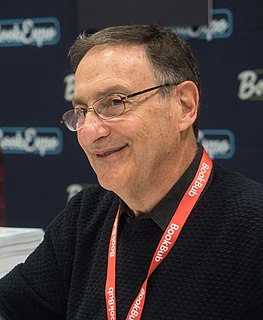A Quote by Victor Hugo
Let us say it now: to be blind and to be loved, is indeed, upon this earth where nothing is complete, one of the most strangely exquisite forms of happiness.
Related Quotes
We may remark in passing that to be blind and beloved may, in this world where nothing is perfect, be among the most strangely exquisite forms of happiness. The supreme happiness in life is the assurance of being loved; of being loved for oneself, even in spite of oneself; and this assurance the blind man possesses. In his affliction, to be served is to be caressed. Does he lack anything? no. Possessing love he is not deprived of light. A love, moreover, that is wholly pure. There can be no blindness where there is this certainty.
There is a notion that complete impartiality is the most fitting and indeed the normal disposition for true exegesis , because it guarantees complete absence of prejudice. For a short time, around 1910, this idea threatened to achieve almost a canonical status in Protestant theology. But now, we can quite calmly describe it as merely comical.
I'd say art is with you. All around you. I'd say when there doesn't seem to be anyone else, there is art. I'd say you can love art how you wish to be loved. And I'd say art is a lifeline to the rest of us - we are out here. You are not alone. There is nothing about you that scares us. There is nothing unlovable about you, either.
But if, indeed, there be a nobler life in us than in these strangely moving atoms; if, indeed, there is an eternal difference between the fire which inhabits them, and that which animates us,--it must be shown, by each of us in his appointed place, not merely in the patience, but in the activity of our hope, not merely by our desire, but our labor, for the time when the dust of the generations of men shall be confirmed for foundations of the gates of the city of God.
I am now experiencing perfect health, abundant prosperity and complete and utter happiness. This is true because the world is full of charming people who now lovingly help me in every way. I am now coming into an innumerable company of angels. I am now living a delightful, interesting and satisfying life of the most widely useful kind. Because of my own increased health, wealth and happiness, I am now able to help others live a delightful, interesting and satisfying life of the most widely useful kind, my good - our good - is universal.
A veil hangs between the two opposites, a mere slip of a thing that is transparent to warn us or comfort us. You hate now but look through this veil and see the possibility of love; you're sad now but look through to the other side and see happiness. Absolute composure to a complete mess - it happens so quickly, all in the blink of an eye.
It is an exquisite and beautiful thing in our nature, that, when the heart is touched and softened by some tranquil happiness or affectionate feeling, the memory of the dead comes over it most powerfully and irresistibly. It would seem almost as though our better thoughts and sympathies were charms, in virtue of which the soul is enabled to hold some vague and mysterious intercourse with the spirits of those whom we loved in life. Alas! how often and how long may these patient angels hover around us, watching for the spell which is so soon forgotten!
The demand for equal rights in every vocation of life is just and fair; but, after all, the most vital right is the right to love and to be loved. Indeed, if partial emancipation is to become a complete and true emancipation of woman, it will have to do away with the ridiculous notion that to be loved, to be sweetheart and mother, is synonymous with being slave or subordinate. It will have to do away with the absurd notion of the dualism of the sexes, or that man and woman represent two antagonistic worlds.




































